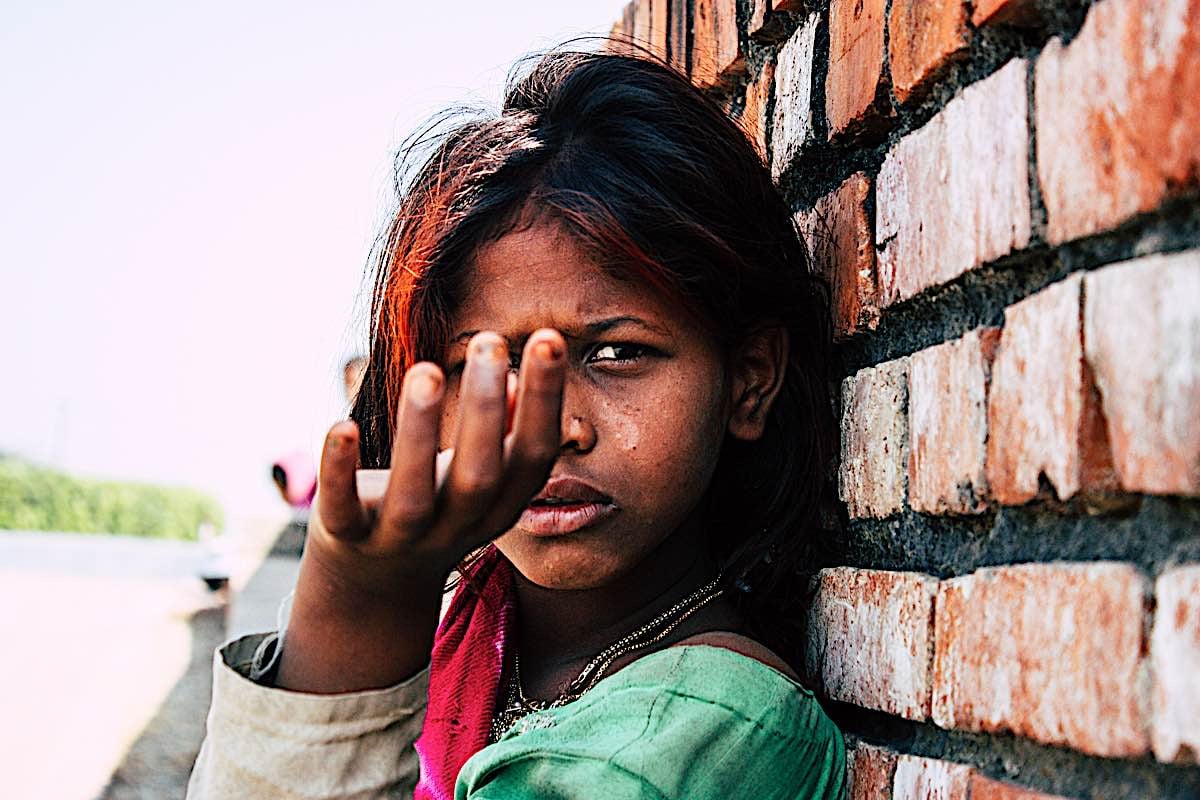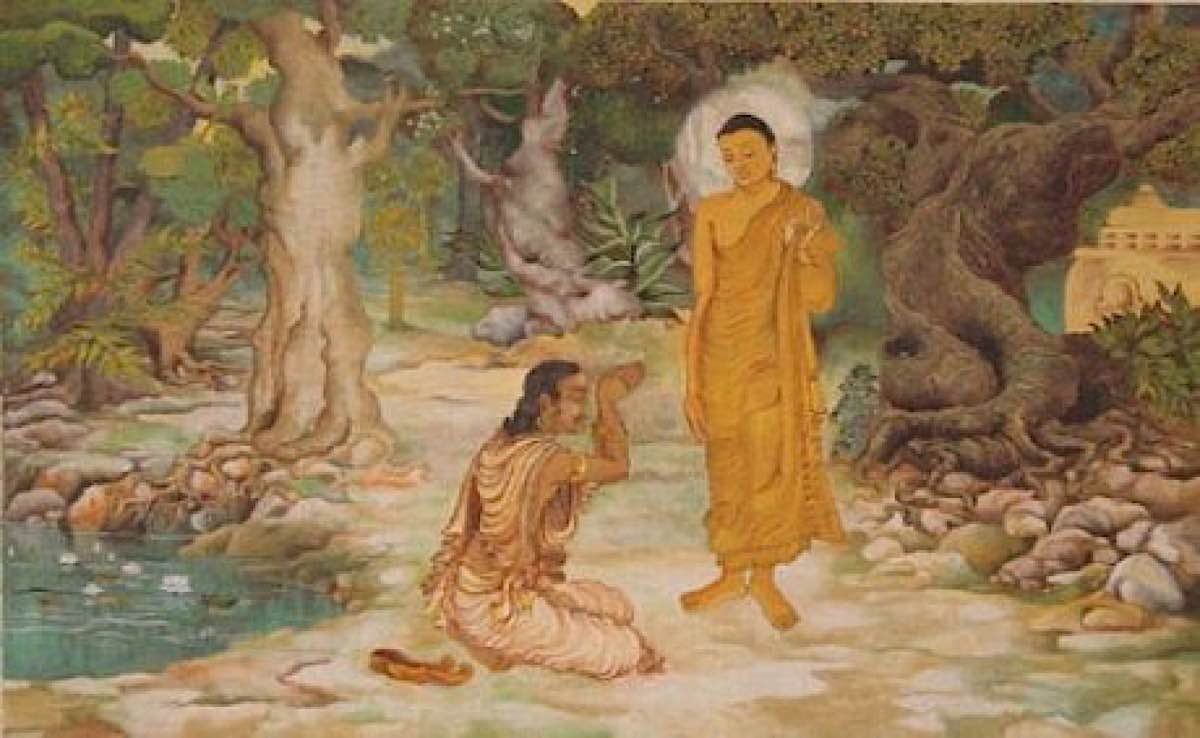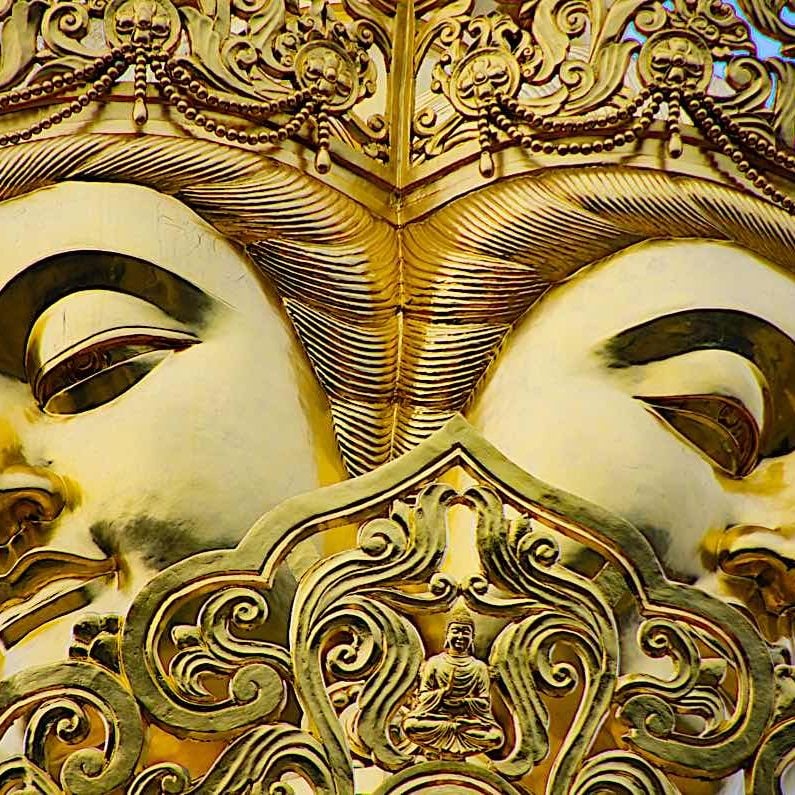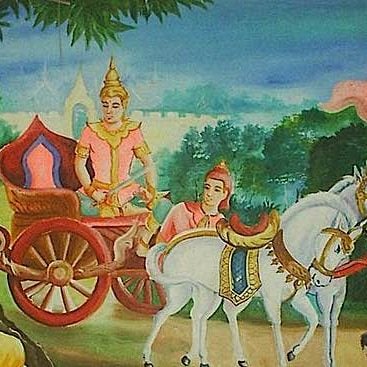Dana, power of giving — a beggar offers the clothes off her own back to the Buddha and becomes a goddess
One of the most moving stories of generosity is found within the cycle of sutta stories featuring “The Great Benefactor” Anathapindika.
Anathapindika, who was very wealthy, remains one of the most recognizable from Buddhist stories. He famously donated Jetavana park, where Buddha and his followers spent the rainy seasons in practice.
While Anathanpindika was a very wealthy merchant, he was the most famous of Gautama Shakyamuni Buddha’s benefactors, famous for paying for a retreat park with enough gold to cover the entire park. Although we cover that inspiring benefactor story of Anathapindika separately, here, one small story within that cycle tells of the beggar girl who had nothing else to give the Buddha but the tattered robes on her back. Removing her own dress, leaving her naked, she offered her last possession to the Buddha — and, according to tradition, her generous act of karma brought her heavenly rebirth as a goddess in her next life.

The key takeaway, in terms of the message of Dana, or giving and generosity is to give what you can afford — to help others, and especially those who help spread the Dharma teachings, the Sangha community. While Anathapindika gave an entire ox cart of gold — a staggering fortune — to buy the park for Buddha and the Sangha, often lost in the cycle is the lovely story of this lovely beggar girl, who had nothing to give but her own clothing:
“The young girl said to herself, “I have never done anything deserving of praise. It would be wonderful to make an offering to the Buddha. But I am poor. What have I to give?” She walked away, wistfully. She looked at her new dress. “I have only this dress to offer him. But I can not go through the streets naked.”
She went home and took off the dress. Then she sat at the window and watched for Anathapindika, and when he passed in front of her house, she threw the dress to him. He took it and showed it to his servants.”
The story of the girl who gave her only dress to the Budhda
Read, this lovely story, here taken from the public domain[1] version of the Life of Buddha (chapter 17)
THE Master was in Rajagriha when a rich merchant named Anathapindika arrived from Cravasti. Anathapindika was a religious man, and when he heard that a Buddha was living in the Bamboo Grove, he was eager to see him.
He set out one morning, and as he entered the Grove, a divine voice led him to where the Master was seated. He was greeted with words of kindness; he presented the community with a magnificent gift, and the Master promised to visit him in Cravasti.

When he returned home, Anathapindika began to wonder where he could receive the Blessed One. His gardens did not seem worthy of such a guest. The most beautiful park in the city belonged to Prince Jeta, and Anathapindika decided to buy it.
“I will sell the park,” Jeta said to him, “if you cover the ground with gold coins.”
Anathapindika accepted the terms. He had chariot-loads of gold coins carried to the park, and presently only a small strip of ground remained uncovered. Then Jeta joyfully exclaimed:
“The park is yours, merchant; I will gladly give you the strip that is still uncovered.”
Anathapindika had the park made ready for the Master; then he sent his most faithful servant to the Bamboo Grove, to inform him that he was now prepared to receive him in Cravasti.
“O Venerable One,” said the messenger, “my master falls at your feet. He hopes you have been spared anxiety and sickness, and that you are not loath to keep the promise you made to him. You are awaited in Cravasti, O Venerable One.”
The Blessed One had not forgotten the promise he had made to the merchant Anathapindika; he wished to abide by it, and he said to the messenger, “I will go.”
He allowed a few days to pass; then he took his cloak and his alms-bowl, and followed by a great number of disciples, he set out for Cravasti. The messenger went ahead, to tell the merchant he was coming.
Anathapindika decided to go and meet the Master. His wife, his son and his daughter accompanied him, and they were attended by the wealthiest inhabitants of the city. And when they saw the Buddha, they were dazzled by his splendor; he seemed to be walking on a path of molten gold.
They escorted him to Jeta’s park, and Anathapindika said to him:
“My Lord, what shall I do with this park?” “Give it to the community, now and for all time,” replied the Master.
Anathapindika ordered a servant to bring him a golden bowl full of water. He poured the water over the Master’s hands, and he said:
“I give this park to the community, ruled by the Buddha, now and for all time.”
“Good!” said the Master. “I accept the gift. This park will be a happy refuge; here we shall live in peace, and find shelter from the heat and from the cold. No vicious animals enter here: not even the humming of a mosquito disturbs the silence; and here there is protection from the rain, the biting wind and the ardent sun. And this park will inspire dreams, for here we shall meditate hour after hour. It is only right that such gifts be made to the community. The intelligent man, the man who does not neglect his own interests, should give the monks a proper home; he should give them food and drink; he should give them clothes. The
monks, in return, will teach him the law, and he who knows the law is delivered from evil and attains nirvana.”
The Buddha and his disciples established themselves in Jeta’s park, Anathapindika was happy; but, one day, a solemn thought occurred to him.
“I am being loudly praised,” he said to himself, “and yet what is so admirable about my actions? I present gifts to the Buddha and to the monks, and for this I am entitled to a future reward; but my virtue benefits me alone! I must get others to share in the privilege. I shall go through the streets of the city, and from those whom I meet, I shall get donations for the Buddha and for the monks. Many will thus participate in the good I shall be doing.”
He went to Prasenajit, king of Cravasti, who was a wise and upright man. He told him what he had decided to do, and the king approved. A herald was sent through the city with this royal proclamation:
“Listen well, inhabitants of Cravasti! Seven days from this day, the merchant Anathapindika, riding an elephant, will go through the streets of the city. He will ask all of you for alms, which he will then offer to the Buddha and to his disciples. Let each one of you give him whatever he can afford.”
On the day announced, Anathapindika mounted his finest elephant and rode through the streets, asking every one for donations for the Master and for the community. They crowded around him: this one gave gold, that one silver; one woman took off her necklace, another her bracelet, a third an anklet; and even the humblest gifts were accepted.
Now, there lived in Cravasti a young girl who was extremely poor. It had taken her three months to save enough money to buy a piece of coarse material, out of which she had just made a dress for herself. She saw Anathapindika with a great crowd around him.
“The merchant Anathapindika appears to be begging,” she said to a bystander.
“Yes, he is begging,” was the reply.
“But he is said to be the richest man in Cravasti. Why should he be begging?”
“Did you not hear the royal proclamation being cried through the streets, seven days ago?”
“No.”
“Anathapindika is not collecting alms for himself. He wants every one to participate in the good he is doing, and he is asking for donations for the Buddha and his disciples. All those who give will be entitled to a future reward.”
The young girl said to herself, “I have never done anything deserving of praise. It would be wonderful to make an offering to the Buddha. But I am poor. What have I to give?” She walked away, wistfully. She looked at her new dress. “I have only this dress to offer him. But I can not go through the streets naked.”
She went home and took off the dress. Then she sat at the window and watched for Anathapindika, and when he passed in front of her house, she threw the dress to him. He took it and showed it to his servants.
“The woman who threw this dress to me,” said he, “probably had nothing else to offer. She must be naked, if she had to remain at home and give alms in this strange manner. Go; try to find her and see who she is.”
The servants had some difficulty finding the young girl. At last they saw her, and they learned that their master had been correct in his surmise: the dress thrown out of the window was the poor child’s entire fortune. Anathapindika was deeply moved; he ordered his servants to bring many costly, beautiful clothes, and he gave them to this pious maiden who had offered him her simple dress.
She died the following day and was reborn a Goddess in Indra’s sky. But she never forgot how she had come to deserve such a reward, and, one night, she came down to earth and went to the Buddha, and he instructed her in the holy law.
NOTES
[1] Life of Buddha, According to the Legends of Ancient India By A. FERDINAND HEROLD. Translated from the French by PAUL C. BLUM
Original Title: La Vie du Bouddha, by André Ferdinand Hérold, Paris, Édition d’Art, H. Piazza [1922], Translation by Paul C. Bloom, New York, A. & C. Boni, [1927]. The copyright on the translation was not renewed.
Scanned at sacred-texts.com, March 2007. Proofed and Formatted by John Bruno Hare. This text is in the public domain in the United States because the original book it was translated prior to January 1st, 1923, and the copyright on the translation was not renewed in a timely fashion as required by law at the time. These files may be used for any non-commercial purpose provided this notice of attribution is left intact in all copies.
More articles by this author

Samantabhadra’s The King of Prayers is the ultimate Buddhist practice how-to and itself a complete practice

The Five Strengths and Powers or pañcabalā in Buddhism — the qualities conducive to Enlightenment: faith, energy, mindfulness, concentration and wisdom

Tara’s Great Dharani Supreme of all Mantras –with Music version– and the Sutra of Tara Who Protects from the Eight Fears: in Tara’s Own Words
Search
Latest Features
Please support the "Spread the Dharma" mission as one of our heroic Dharma Supporting Members, or with a one-time donation.
Please Help Support the “Spread the Dharma” Mission!

Be a part of the noble mission as a supporting member or a patron, or a volunteer contributor of content.
The power of Dharma to help sentient beings, in part, lies in ensuring access to Buddha’s precious Dharma — the mission of Buddha Weekly. We can’t do it without you!
A non-profit association since 2007, Buddha Weekly published many feature articles, videos, and, podcasts. Please consider supporting the mission to preserve and “Spread the Dharma." Your support as either a patron or a supporting member helps defray the high costs of producing quality Dharma content. Thank you! Learn more here, or become one of our super karma heroes on Patreon.
Lee Kane
Author | Buddha Weekly
Lee Kane is the editor of Buddha Weekly, since 2007. His main focuses as a writer are mindfulness techniques, meditation, Dharma and Sutra commentaries, Buddhist practices, international perspectives and traditions, Vajrayana, Mahayana, Zen. He also covers various events.
Lee also contributes as a writer to various other online magazines and blogs.















